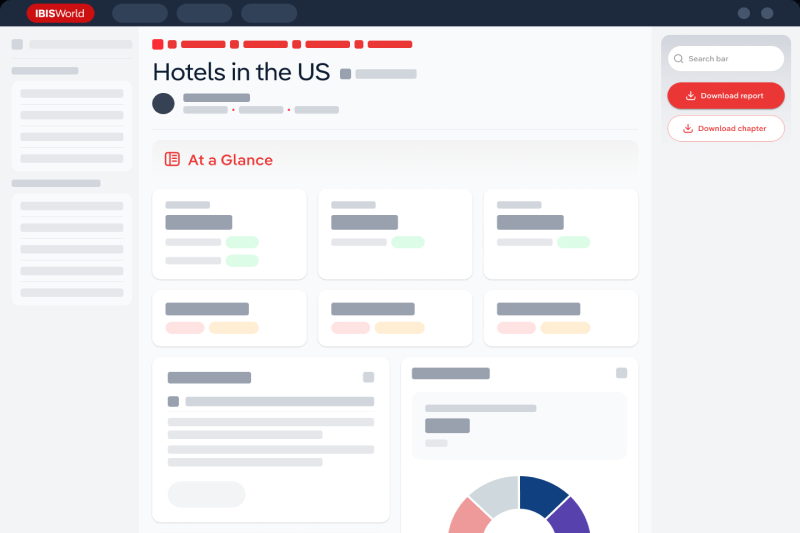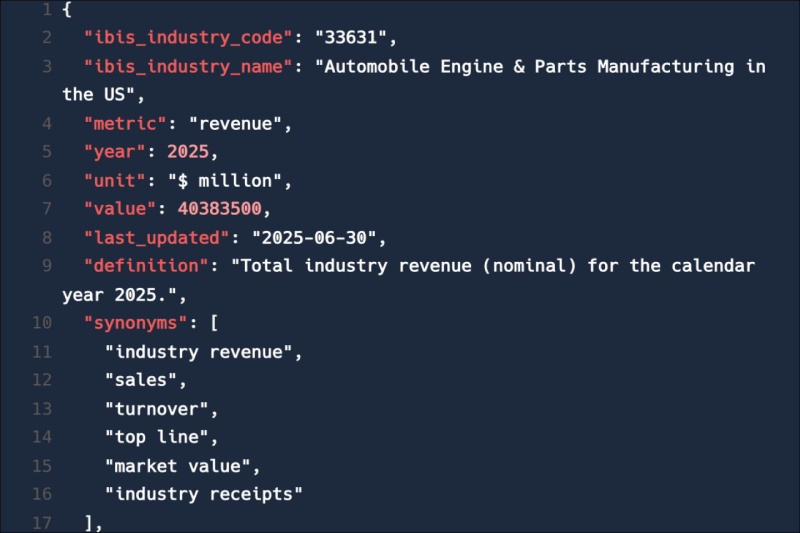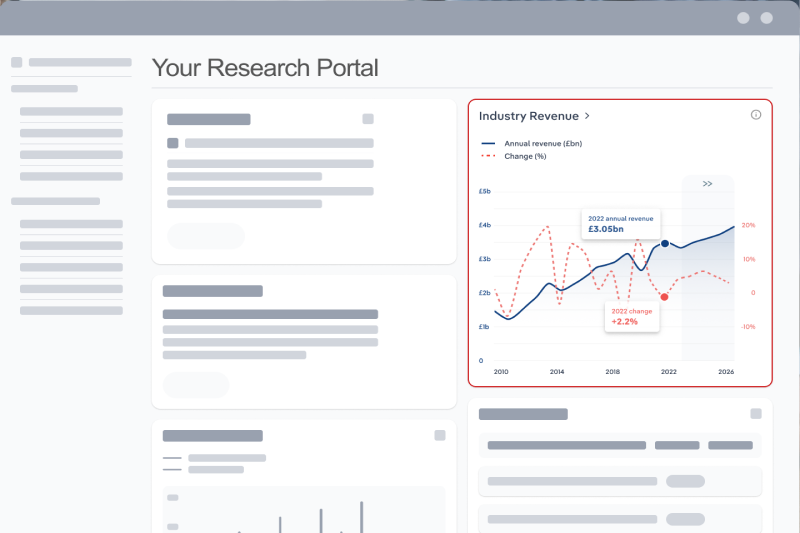IBISWorld Platform
Answer any industry question in minutes with our entire database at your fingertips.

Magazine and periodical publishers sell print and digitized versions, but plummeting print advertising and low product popularity have led to a steady drop in revenue. Advertisers and consumers have devoted more time, energy and dollars to online publications and digital channels, forcing companies to bolster their online presence and shrink their print business. A backdrop of falling print circulation and shrinking ad dollars has forced publishers to adapt rapidly, slashing print runs, consolidating operations and turning to new business models in a bid to remain viable. Revenue is estimated to fall at a CAGR of 2.2% to $39.3 billion in 2026, including a 3.8% dip in 2026 alone as profit slides to 11.1%.

Answer any industry question in minutes with our entire database at your fingertips.

Feed trusted, human-driven industry intelligence straight into your platform.

Streamline your workflow with IBISWorld’s intelligence built into your toolkit.
IBISWorld's research coverage on the Magazine & Periodical Publishing industry in the United States includes market sizing, forecasting, data and analysis from 2016-2031. The most recent publication was released February 2026.
The Magazine & Periodical Publishing industry in the United States operates under the NAICS industry code 51112. This industry produces and distributes magazines and periodicals in print and online. However, publishers that exclusively sell online magazines or periodicals are excluded from this industry. Related terms covered in the Magazine & Periodical Publishing industry in the United States include circulation, consumer magazine and readership.
Products and services covered in Magazine & Periodical Publishing industry in the United States include Entertainment magazines, Academic and professional and Home and living magazines.
Companies covered in the Magazine & Periodical Publishing industry in the United States include Hearst Communications Inc. and Meredith Corporation.
The Performance chapter covers detailed analysis, datasets, detailed current performance, sources of volatility and an outlook with forecasts for the Magazine & Periodical Publishing industry in the United States.
Questions answered in this chapter include what's driving current industry performance, what influences industry volatility, how do successful businesses overcome volatility, what's driving the industry outlook. This analysis is supported with data and statistics on industry revenues, costs, profits, businesses and employees.
The Products and Markets chapter covers detailed products and service segmentation and analysis of major markets for the for the Magazine & Periodical Publishing industry in the United States.
Questions answered in this chapter include how are the industry's products and services performing, what are innovations in industry products and services, what products or services do successful businesses offer and what's influencing demand from the industry's markets. This includes data and statistics on industry revenues by product and service segmentation and major markets.
The Geographic Breakdown chapter covers detailed analysis and datasets on regional performance of the Magazine & Periodical Publishing industry in the United States.
Questions answered in this chapter include where are industry businesses located and how do businesses use location to their advantage. This includes data and statistics on industry revenues by location.
The Competitive Forces chapter covers the concentration, barriers to entry and supplier and buyer profiles in the Magazine & Periodical Publishing industry in the United States. This includes data and statistics on industry market share concentration, barriers to entry, substitute products and buyer & supplier power.
Questions answered in this chapter include what impacts the industry's market share concentration, how do successful businesses handle concentration, what challenges do potential industry entrants face, how can potential entrants overcome barriers to entry, what are substitutes for industry services, how do successful businesses compete with substitutes and what power do buyers and suppliers have over the industry and how do successful businesses manage buyer & supplier power.
The Companies chapter covers Key Takeaways, Market Share and Companies in the Magazine & Periodical Publishing industry in the United States. This includes data and analysis on companies operating in the industry that hold a market share greater than 5%.
Questions answered in this chapter include what companies have a meaningful market share and how each company is performing.
The External Environment chapter covers Key Takeaways, External Drivers, Regulation & Policy and Assistance in the Magazine & Periodical Publishing industry in the United States. This includes data and statistics on factors impacting industry revenue such as economic indicators, regulation, policy and assistance programs.
Questions answered in this chapter include what demographic and macroeconomic factors impact the industry, what regulations impact the industry, what assistance is available to this industry.
The Financial Benchmarks chapter covers Key Takeaways, Cost Structure, Financial Ratios, Valuation Multiples and Key Ratios in the Magazine & Periodical Publishing industry in the United States. This includes financial data and statistics on industry performance including key cost inputs, profitability, key financial ratios and enterprise value multiples.
Questions answered in this chapter include what trends impact industry costs and how financial ratios have changed overtime.
The Industry Data chapter includes 10 years of historical data with 5 years of forecast data covering statistics like revenue, industry value add, establishments, enterprises, employment and wages in the Magazine & Periodical Publishing industry in the United States.
More than 6,000 businesses use IBISWorld to shape local and global economies
We were able to supplement our reports with IBISWorld’s information from both a qualitative and quantitative standpoint. All of our reporting now features some level of IBISWorld integration.

IBISWorld delivers the crisp business knowledge we need to drive our business. Whether it be serving up our major clients, winning new business or educating on industry issues, IBISWorld brings real value.

IBISWorld has revolutionised business information — which has proved commercially invaluable to exporters, investors and public policy professionals in Australia and overseas.

When you’re able to speak to clients and be knowledgeable about what they do and the state that they operate in, they’re going to trust you a lot more.

The market size of the Magazine & Periodical Publishing industry in the United States is $39.3bn in 2026.
There are 4,634 businesses in the Magazine & Periodical Publishing industry in the United States, which has declined at a CAGR of 2.3 % between 2021 and 2026.
The Magazine & Periodical Publishing industry in the United States is unlikely to be materially impacted by import tariffs with imports accounting for a low share of industry revenue.
The Magazine & Periodical Publishing industry in the United States is unlikely to be materially impacted by export tariffs with exports accounting for a low share of industry revenue.
The market size of the Magazine & Periodical Publishing industry in the United States has been declining at a CAGR of 2.2 % between 2021 and 2026.
Over the next five years, the Magazine & Periodical Publishing industry in the United States is expected to decline.
The biggest companies operating in the Magazine & Periodical Publishing industry in the United States are Hearst Communications Inc. and Meredith Corporation
Editing articles and Researching topics are part of the Magazine & Periodical Publishing industry in the United States.
The company holding the most market share in the Magazine & Periodical Publishing industry in the United States is Hearst Communications Inc..
The level of competition is high and increasing in the Magazine & Periodical Publishing industry in the United States.




